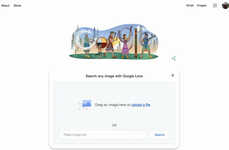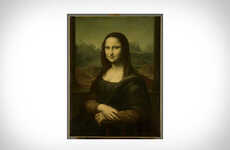
Google is Turning Searches for Art Into Virtual Museum Visits
Laura McQuarrie — June 6, 2017 — Art & Design
References: blog.google & designtaxi
There are many places where web browsers are able to virtually visit museums online, and Google is now bringing a similar experience to search engine art queries.
As part of a collaboration between Google Search engineers and the Google Arts & Culture team, Google created a new way for Internet users to immerse themselves in the world of art. As of now, searching for an artist's name brings up a detailed interactive Knowledge Panel for diving deeper into the creator's work.
Most impressively, this project also introduces a new way for users to make the most of the Street View feature, by previewing famous artwork in virtual museum settings. These pieces of art are annotated and can be viewed in extremely high quality, making it possible to see pieces like The Kiss and The Starry Night like never before.
As part of a collaboration between Google Search engineers and the Google Arts & Culture team, Google created a new way for Internet users to immerse themselves in the world of art. As of now, searching for an artist's name brings up a detailed interactive Knowledge Panel for diving deeper into the creator's work.
Most impressively, this project also introduces a new way for users to make the most of the Street View feature, by previewing famous artwork in virtual museum settings. These pieces of art are annotated and can be viewed in extremely high quality, making it possible to see pieces like The Kiss and The Starry Night like never before.
Trend Themes
1. Virtual Art Galleries - Creating virtual spaces to showcase art provides opportunities for artists and galleries to reach wider audiences and immersive experiences.
2. Interactive Art Experiences - Developing interactive ways for people to explore and engage with art through technology creates opportunities for businesses to provide unique and creative experiences.
3. Smart Image Recognition - The use of smart image recognition technology in the art world creates opportunities for innovative and powerful ways to catalog, document, and share art collections.
Industry Implications
1. Art Galleries and Museums - Adapting to virtual and interactive technologies can help art galleries and museums reach broader audiences and offer more engaging experiences.
2. Technology and Software Development - Developing software and technologies that integrate with the art world creates opportunities for innovation and partnerships with galleries, museums and artists.
3. Education and Learning - Using virtual and interactive technologies in art education provides opportunities for immersive and accessible learning experiences for students of all ages and backgrounds.
3.4
Score
Popularity
Activity
Freshness















